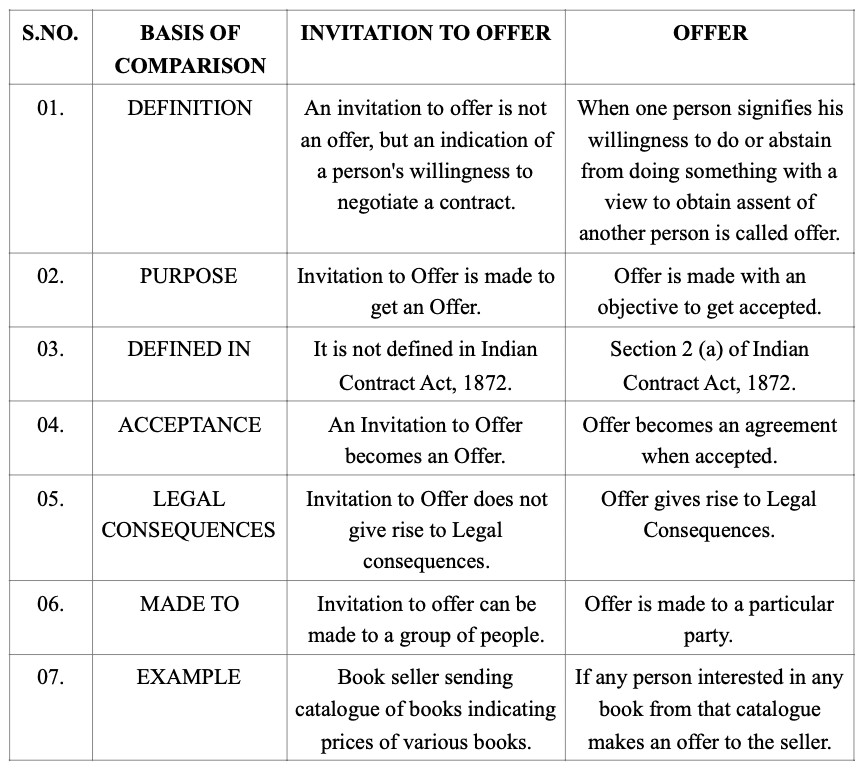
Offer
Section 2(a) of the Indian Contract Act, 1872 defines proposal. When one person signifies his willingness to do or abstain from doing something with a view to obtain the assent of another person is called a proposal.
The person who makes an offer is called the Offeror and the person to whom the offer is made is called the Offeree.
When this proposal or offer is accepted by the offeree, it becomes a promise.
Example: X says to Y, “Will you purchase this book for Rs.100?” So, here X is the offeror who is making an offer to Y to purchase his book, and Y is the offeree to whom an offer is made.
Comparison Between Offer and Invitation to Offer
1. Definition
Invitation to offer: An invitation to offer is not an offer, but an indication of a person’s willingness to negotiate a contract.
Offer: When one person signifies his willingness to do or abstain from doing something with a view to obtain the assent of another person is called an offer.
2. Purpose
Invitation to offer: Invitation to Offer is made to get an offer.
Offer: Offer is made with an objective to get accepted.
3. Defined In
Invitation to offer: It is not defined in the Indian Contract Act, 1872.
Offer: It is defined in section 2(a) of the Indian Contract Act, 1872.
4. Acceptance
Invitation to offer: An Invitation to Offer becomes an offer.
Offer: Offer becomes an agreement when accepted.
5. Legal Consequences
Invitation to offer: Invitation to Offer does not give rise to legal consequences.
Offer: Offer gives rise to legal consequences.
6. Made To
Invitation to offer: Invitation to offer can be made to a group of people.
Offer: Offer is made to a particular party.
7. Example
Invitation to offer: Bookseller sending catalogue of books indicating prices of various books.
Offer: If any person interested in any book from that catalogue makes an offer to the seller.
Here is the same information in tabular form.

Cases: Invitation to Offer
A. Pharmaceutical Society of Great Britain vs Boots Cash Chemists (Southern) Ltd (1953): It was held in this case that display of articles in a shop, even on a self-service basis, is an invitation to offer. When the customer selects the article and brings it to the cash desk, then it is a proposal/offer by the customer, the acceptance of which can be given by the shopkeeper by accepting payment from the customer.
B. Harvey vs Facey (1893): In this case, the defendants were the owner of a plot of land known as Bumper Hall Pen.
Harvey sent a Telegram to Facey which stated: “Will you sell us Bumper Hall Pen? Telegraph lowest cash price-answer paid.”
Facey replied by telegram: “Lowest price for Bumper Hall Pen £900.”
Harvey then replied: “We agree to buy Bumper Hall Pen for the sum of £900 asked by you. Please send us your title deed in order that we may get an early possession.”
Facey then stated that he did not want to sell.
In this case, the quotation of price was held not to be an offer.
The House of Lords held that the telegram was an invitation to offer, not a valid offer. Therefore no valid contract existed. The telegram only advised of the price, it did not explain other terms or conditions and therefore could not create any legal obligation.
Harvey’s telegram “accepting” £900 was instead an offer that Facey could either accept or reject. He rejected it, so there was no contract created.
Intention to Create Legal Relationship
Offer should be made with the intention to create a legal relationship. Promisor intends that he has no intention does not exempt him from his liability. Test to know ‘intention’ can be assessed by knowing the conduct of the parties or what a reasonable person would think in those surrounding circumstances.
Letter of Intent indicates a party’s intention to enter into a contract on the lines of the letter.
Case: Balfour vs Balfour (1919)
In this case, the husband went with his wife on vacation. At the time of returning back, the wife got ill and could not accompany the husband. Husband promised to pay £30 per month as maintenance.
Husband failed to pay the amount after which this case was filed.
It was held that in this case, there was no intention to create a legal relationship, and the husband is not liable. It was further held that the same principle is applied in other close relationships.
Communication of Offer Necessary
According to section 4 of the Act, communication of proposal is complete when it comes to the knowledge of the person to whom it is made. Acting in ignorance of an offer does not amount to acceptance of the same.
Case: Lalman Shukla vs Gauri Dutt
In this case, the defendant’s nephew was absconded from home. He sent his servant to find his boy. Then the defendant issued hand billing announcing a reward of Rs. 501 to a person who will find the boy.
The servant was successful in searching for the boy. When the plaintiff came to know about the reward, he asked the defendant to pay the same to which the defendant refused.
It was held that since the plaintiff was ignorant of the offer of reward, his act of bringing the lost boy is not acceptance of offer, and he is not entitled to claim.
Types of Offer
i. Cross Offers: When the offers made between two persons to each other containing similar terms of bargains cross each other in post, they are known as Cross Offers.
Example: A offers to sell a watch to B for Rs 2000 by post. Same day B offers to purchase A’s watch of Rs 2000 by post. In this case, no contract is made. Contract arise only if either A or B offers.
ii. Special offer: It is an offer made to a specific person.
iii. General Offer: It is an offer made not to any particular person but to the public at large.
Case: Carlill vs Carbolic Smoke Ball Co.
Contract arising out of general offer. Defendant gave an advertisement stating Smoke Ball is a preventive remedy against influenza. It was announced that sum of Rs. 1000 given if, after usage, that person is detected with influenza. A lady got influenza and sued the defendant to claim the reward.
It was held that this being a general offer addressed to all the public has been converted into a contract when the lady accepted the offer by performing the required conditions. Thus, she was entitled to claim the reward.
iv. Standing/Open/Continuing Offer: It is an offer allowed to remain open for acceptance over a period of time.
Read Next:
1. Essential Elements of Proposal and Kinds of Offer
2. Definition and Circumstances of Quasi Contracts in the Contract Act
3. Definition and Essentials of Acceptance in Contract Act
- What Are the Rights of Private Sector Employees in India? - 4th April 2023
- Is an Unmarried Woman Legally Allowed To Have an Abortion in India? - 27th June 2022
- What Are the Two Main Schools and Four Sub-Schools Under Hindu Law? - 27th April 2022








Very lucidly n exhaustively explained
That’s very kind of you. Glad you liked it.